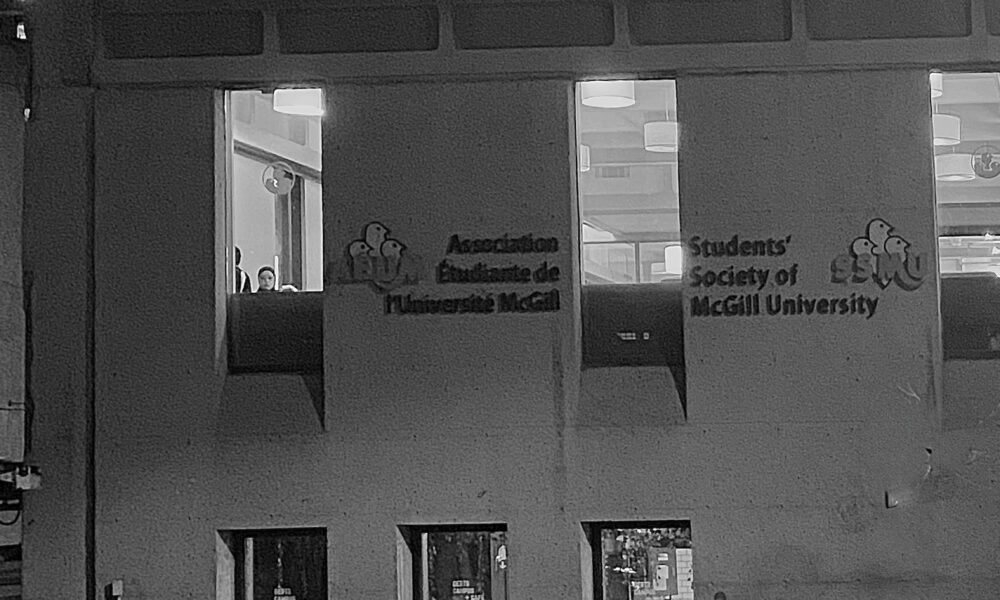On Nov. 21, the Students’ Society of McGill University (SSMU) held its penultimate Legislative Council meeting of the semester. Following over three hours of debate surrounding definitions of antisemitism and consultation processes, the Council failed to pass the proposed Policy Against Antisemitism after a secret ballot vote.
The Council meeting began with Executive Reports, where SSMU Vice-President (VP) Finance Pauline Jolicoeur announced SSMU is no longer projecting a deficit this 2024-2025 fiscal year. VP University Affairs Abe Berglas reported efforts to recommence paused gender-neutral bathroom initiatives and plans for a campus demilitarization event in January with student stakeholders, specifically from marginalized demographics.
A majority of the prolonged meeting was dedicated towards a proposed antisemitism policy that had been tabled at the Nov. 7 Legislative Council meeting. The motion for the policy, presented by VP External Affairs Hugo-Victor Solomon, aimed to establish specific guidelines for combatting antisemitism while defining SSMU’s role in protecting Jewish students and providing resources for support and advocacy. The motion largely drew from the Jerusalem Declaration on Antisemitism rather than the International Holocaust Remembrance Alliance (IHRA) definition, a decision that became central to the evening’s debate.
Some General Members present felt that Solomon was unqualified to modify existing definitions of antisemitism. Nicole Nashen, VP of the Jewish Law Student Association (JLSA), spoke on behalf of her constituency.
“I want to express that members of the JLSA and the members of the Jewish community at McGill at large […] feel that this policy does not protect us against antisemitism,” Nashen said.
Solomon, who identified himself as “a proud Jewish member of this assembly,” emphasized the proposed motion’s inclusive approach to protecting a diverse Jewish student body, regardless of political ideology.
“When looking at other definitions that members of the gallery have raised such as the IHRA, those definitions frankly have eleven components […] specifically seven of which are about Israel,” Solomon said. “And this policy, which has 35 components, does specifically address the intersection of antisemitism and racism in the form of discrimination towards Jews of colour.”
Solomon detailed consultations with Jewish campus groups in producing this policy, including Hillel McGill, Chabad at McGill, The McGill Chavurah, Independent Jewish Voices McGill, and the McGill Jewish Studies Students’ Association (JSSA). Following a motion for Solomon to provide the emails from his consultations, specifically with Chabad at McGill, he noted that of the five groups contacted, a majority participated in the collaborative process, though JSSA declined to participate, citing their focus beyond Jewish life. Solomon consulted the Dean of Students’ Office and Jewish Students Liaison, among other parties, regarding the policy’s implementation at McGill.
SSMU VP Internal Affairs Zeena Zahida defended the policy’s approach during the debate.
“This policy does not limit what is considered antisemitism, but more clearly defines it to protect all Jewish students, Zionist and anti-Zionist alike,” she said. “To very clearly clarify the line between political discourse, valid political discourse, and antisemitism is a good thing objectively for everybody on campus.”
The debate intensified around the policy’s approach to discussions of Israel and Palestine. Critics favoured adopting the IHRA definition of antisemitism, which Nashen argued “provides clear guidelines” and has been adopted by Canada and most European nations. Supporters of the policy defended its recognition of diverse Jewish perspectives and experiences, arguing it would protect all students from antisemitism regardless of their stance on the state of Israel.
The Council ratified their last motion on antisemitism in 2018, which expired one year after passing without renewal. After lengthy debates and multiple amendment attempts, the Council was unable to pass the newly-proposed policy. There remains no SSMU policy in place protecting Jewish students against antisemitism.
Moment of the Meeting:
In a final vote, the motion failed with 10 executives opposed, 10 in favour, and five abstaining. Half of the room cheered in elation at the results, while the other side shook their heads in disbelief.
Soundbite:
“This policy would actively combat that innate fear of being doxxed both from McGill admin and from students […] It highlights the use of this policy as it protects anti-Zionist Jews like myself who are being harassed and yelled at on campus for expressing my political and personal beliefs on what it means to be Jewish.” — General Member Alice Maitlis on the importance of passing the policy.









